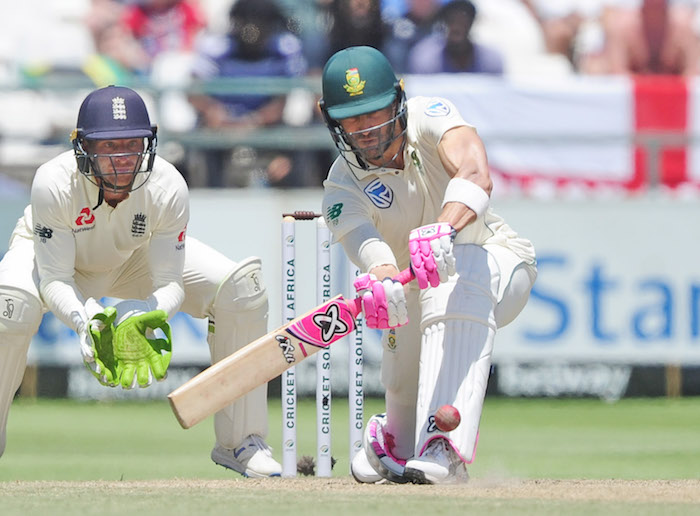Everyone with an opinion on cricket, from the beer-guzzling punter to the meticulous, data-obsessed coach, will tell you that the leap from domestic to international ranks is a gargantuan one, writes DANIEL GALLAN.
This is hardly revelationary. By its nature, representing one’s country should signify the highest echelon of any sport. What is not universally accepted is what makes Test cricket the undisputed pinnacle of the game.
The reasons are varied. Is it the quality of opposition? The heightened pressure of nationalism? The stress of extra pay?
New magazine issue: Why De Kock must bat at four
For Proteas captain Faf du Plessis, one factor that helps divide domestic and international cricket is the constant fluctuations of praise and damnation from the public.
‘When you play international cricket for as long as I have it comes with media for you and media against you,’ Du Plessis said on Wednesday before the third Test against England at St George’s Park in Port Elizabeth. ‘To read too much into it, for and against, is really important for any player not to get sucked in too much.
‘The difference between players who play at this level for a short or a long time is how mentally they can cope with the pressures that come with it.’

Du Plessis was fielding questions regarding the social media maelstrom that has been swirling since his side’s 189-run defeat in Cape Town. No top-level team in the world would escape criticism after such a result. But this is South Africa, where spears thrust from the public are laced with the venom that continues to ooze from our evil history.
Du Plessis is not in great form. He said as much as he played with the idea of fielding an extra batter at St George’s to shore up his wobbling top order. Scores of 19, 1, 29, 29, 4, 1 and 5 in his last seven innings for 88 runs at an average of 12.5 are impossible to defend. And yet his position in the side is secure.
Temba Bavuma’s last seven knocks contributed scores of 0, 32, 38, 8, 0, 18 and 6 totalling 102 at an average of 14.5. Those numbers are marginally better than Du Plessis’ and yet Bavuma was dropped to franchise cricket.
Warriors for social justice – a noble cause that has somehow become a disparaging term – have rightly decried the whitening of the Proteas. But the above cherry-picked stats do not accurately portray the overall contributions of both players.
Right now, Du Plessis is undroppable. He is the best South African captain at present – some might argue of all time – and is the leader of a batting unit low on confidence. Bavuma is a developing player, one who has been unfairly caught in a tug of war and has been denied the freedom to be seen as a cricketer first and a black person second.
‘I’m not getting into a battle between myself and Temba about who plays and who doesn’t,’ Du Plessis said. ‘My performances also need to improve.’
He’s not alone. The trouncing at Newlands suggests improvements are needed across the board. The strike bowlers failed to penetrate, Keshav Maharaj was battered and the batters failed to match the efficiency of the English.
With all this in mind, Du Plessis is considering tweaking his team. What he tweaks, is anyone’s guess.

‘We’re maybe looking at [Dane Paterson, who would be making his Test debut] but we haven’t decided on that,’ Du Plessis said. ‘For who is the big question.’
‘The nature of the ground, the conditions here, his style of bowling can work here. But if we do that we could go with one less batter or spinner. There is merit in both. You need a spinner at St George’s and you also need a longer batting lineup. So, it’s not an easy decision. Those are the options on the table.’
Adding to the confusion has been talk of wind direction, humidity and reverse swing. If the wind blows from the east it’s apparently good for bowling. If it’s humid the ball will swing more and for longer. If the ball lands on the scratchy surface just next to the playing strip enough times the ball may start reversing, as it did here when South Africa beat Australia by six wickets in 2018.
Joe Root said that it is important to study history but you cannot be swayed by it. England have a wonderful record at this ground – winning five, drawing three and losing just once – but last played here in 2004 when they won by seven wickets.
History can’t be ignored, whether that is in conversations about reverse swing or racial representation, but it can’t cloud one’s judgement either. Du Plessis has some tough cricket decisions to make. Clarity is needed in these muddled times with the series on the line.
Photo: Gallo Images







